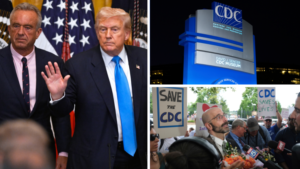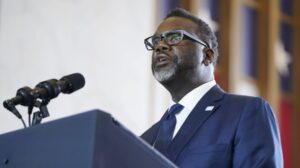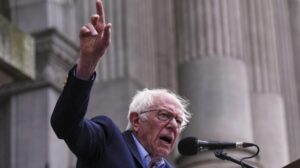Politics
Blue state GOPers shudder

With help from Amira McKee

MUTUALLY ASSURED REDISTRICTING: The multi-front, tit-for-tat gerrymandering war is putting New York Republicans in a perilous position, and they’re acting quickly to condemn Hochul — and even buck President Donald Trump — to avoid becoming casualties as Dems seek retaliatory redistricting.
After President Donald Trump pressed Texas Gov. Greg Abbott to redraw his state’s congressional maps in a way that would add five GOP seats, Hochul responded with a pledge to “fight fire with fire.”
New York’s Republican Reps. Mike Lawler, Elise Stefanik, Nicole Malliotakis and Nick LaLota don’t want to become collateral damage. To that end, some are even willing to blast Trump’s efforts in Texas.
“What Texas is doing is wrong and I’m opposed to it,” Lawler texted Playbook, noting that he’s sponsoring a bill with fellow blue state Republican Rep. Kevin Kiley of California that would ban gerrymandering nationwide.
Malliotakis is speaking out against Texas’ redistricting efforts too.
“I may differ in opinion from many of my colleagues on this, particularly the ones from Texas,” she told The Joe Piscopo Show on Monday. “I’m not somebody who’s supportive of any type of gerrymandering.”
Their efforts come as Hochul continues to burn away any pretense that New York’s redistricting process should be independent.
“Up until now, Democrats have treated our political system like it’s still governed by norms, guarded by limits and rooted in fairness,” Hochul wrote in an op-ed published today in the Houston Chronicle. “Rules were meant to be followed. It hurts to say it, but that era has come to an end.”
On Monday, as Hochul hosted Texas lawmakers fleeing their state to prevent passage of redistricting legislation, Assembly Speaker Carl Heastie told New York’s Republicans to pipe up.
“Perhaps the Republican members of Congress here in New York could say to their Republican colleagues in Texas, ‘Hey, slow down on this, because this can also affect us,’” he said.
But the Republicans speaking out about what’s going on deep in the heart of Texas still won’t forget Dems’ redistricting past at home.
New York Democrats tried to redraw district lines in their favor long before Trump told Texas to make changes of its own. In 2021, voters rejected a Democrat-led ballot referendum to weaken the independence of the state’s redistricting process. The next year, the courts blocked their attempts to redraw the maps in a way that would favor Democrats.
“New York Dems have been trying to gerrymander and rig the elections for years, well before what Texas is doing,” Lawler said. “They are not doing this in response, they are using this as cover to justify what they have wanted to do.”
Lawler said he’s still working on the specifics of his federal anti-gerrymandering bill.
Stefanik — who’s considering a gubernatorial run against Hochul — said she would work to prevent mid-decade redistricting in New York if elected governor. But she went silent when Playbook asked her if she’s against mid-decade redistricting in Texas.
“As Governor, Congresswoman Stefanik would support the NY State Constitution that is explicit with once a decade redistricting and the will of the voters of NY that voted for the independent bipartisan commission,” her spokesperson Alex DeGrasse said in a statement. “Congresswoman Stefanik successfully led the effort to protect the integrity of NY elections and fair district lines while Kathy Hochul tried twice to illegally gerrymander and suppress the will of New York voters.”
Hochul spokesperson Jen Goodman responded to New York’s GOP members.
“If New York House Republicans are serious about protecting democracy, they should direct their outrage at Donald Trump and their colleagues in Texas trying to dismantle it,” she said. “Until Texas stands down, Governor Hochul will continue exploring every available option to fight fire with fire and ensure New York voters are not silenced.”— Jason Beeferman

A FEDERAL SUIT AGAINST EVEN-YEAR ELECTIONS: Republicans are planning to file a federal lawsuit challenging New York’s new law moving most local elections to even-numbered years.
The suit is in the works as the state Court of Appeals is scheduled to hear arguments in September in a series of state-level cases brought over the 2023 law, which rescheduled town and county races. A mid-level appellate court concluded in May that the law doesn’t run afoul of the state constitution, despite challenges from eight GOP county executives.
Arguments in the forthcoming federal lawsuit were previewed in an amicus brief filed today in the state’s top court on behalf of the town of Riverhead and Nassau County Legislator Mazi Pilip. They’re saying the state law runs afoul of the U.S. Constitution.
“The primary purpose of the First Amendment is not to increase raw participation numbers, but rather to protect the public dialogue and debate that sits at the very heart of our democracy. When local elections are consolidated with federal and statewide contests, local candidates are pushed to the margins of the ‘public square,’” according to the brief, a copy of which was obtained by Playbook.
“The First Amendment doesn’t stop at the steps of the state capital,” said William A. Brewer III, the counsel representing Riverhead and Pilip. “Our clients contend that in their communities, democracy will be drowned out — not by censorship, but by unnecessary burdens to local speech.”
State Sen. James Skoufis, who sponsored the now-on-the-books bill to reschedule elections, said the suit is evidence local officials like Pilip are “afraid of more voters participating in their elections.”
“This is desperate and pathetic,” Skoufis said. “It is obviously constitutional — there are other states that have done it, there are other jurisdictions that have done it. It unequivocally and dramatically increases voter turnout. So it’s laughable on its face that anyone thinks this isn’t going to be completely thrown out of a courtroom.” — Bill Mahoney

BOOK OF JOB APPROVAL: Mayor Eric Adams held a rally on the steps of City Hall today with a pan-city collection of faith leaders backing his run. The incumbent, who is limping along in the polls and facing high disapproval ratings from voters, used the opportunity to highlight his accomplishments and re-air his longstanding grievances with the press.
Adams, who repeatedly criticized Andrew Cuomo for avoiding the media during the Democratic primary, began the event with a warning: He would not be taking questions.
“After I speak, I’m bouncing,” Adams said. “You’re not going to tarnish the good news of today.”
He closed his remarks by asking God for a “special prayer.”
“Lay hands on our media,” he said. “Heal them. Put honesty in their hearts.”
Adams has taken umbrage at coverage of his since-dismissed federal bribery case, allegations of a quid pro quo with President Donald Trump and corruption probes that hollowed out his inner circle.
As he left, reporters peppered him with queries anyway, prompting the mayor to clap and chant “ask me the good news questions” as he and his retinue disappeared into City Hall. — Joe Anuta

RESOLUTION TO BACK THE BLUE: Stefanik introduced a resolution today to condemn the mass shooting last week in midtown Manhattan, where five were killed including an off-duty NYPD officer.
The measure also condemns “divisive rhetoric and violence against federal, state, and local law enforcement officers and urges lawmakers to redouble their commitment to backing the blue.”
The North Country Republican said in a statement that “anti-police policies should have no place in our great state.”
Meanwhile, on Long Island, Nassau County Executive Bruce Blakeman and Rep. Andrew Garbarino, both Republicans, sought to emphasize the importance of training and collaboration among local, state and federal law enforcement officials. They toured the Nassau County Police Department’s intelligence center and police training village.
Garbarino, the new chair of the House Homeland Security Committee, said his focus will be counterterrorism, including in neighboring New York City.
“New York is the greatest city, it’s also the one that’s most top targeted and we have to protect it,” the House member said.
Stefanik and Blakeman, potential candidates for governor next year who are close allies of President Donald Trump, have slammed Democrats for policies and rhetoric they say is dangerous for law enforcement officials. But they did not reference their political affiliation in their remarks today. — Emily Ngo
— MAMDANI DRAWS JEWISH VOTERS: Zohran Mamdani appealed to Jewish New Yorkers who were drawn to his affordability-focused platform and unbothered by or supportive of his views on Israel and Gaza. (The New York Times)
— CUOMO RECALIBRATES: Andrew Cuomo’s revamped campaign is shifting away from his historically vehement defense of Israel. (Bloomberg)
— ICE CRACKDOWN: Most immigrants arrested in New York City since the Trump administration ramped up its stringent border policies do not have criminal charges or convictions. (The New York Times)
Missed this morning’s New York Playbook? We forgive you. Read it here.
Politics
Cleveland’s mayor wants Democrats to know millennials like him are impatient and ready to lead
The age of the millennial politician is here — nowhere more obviously than in city halls around the country. Cleveland Mayor Justin Bibb surprised Ohio’s political establishment in 2021 by soaring to victory at the age of 34. The former Obama intern-turned-Key Bank executive is now the president of the Democratic Mayors’ Association and a rising star within the party.
I met up with Bibb — clad in his signature round tortoiseshell glasses and a slim-cut navy suit suit even on a hot and humid Sunday in July. We talked about his city and its relationship with the federal government — from the impact federal cuts may have on his city’s hospital system to his desire to work with Republicans and President Donald Trump on permitting reform.
Over a plate of mac and cheese at trendy Cleveland bistro Luxe, Bibb said that Democrats at large have missed the fact that millennials are impatient — not willing to wait their turn to run for office, deeply entrepreneurial and chomping at the bit to solve the crises they’ve spent their entire lives navigating.
“When I ran for mayor, a lot of folks — a lot of establishment Democrats in the party — told me to wait my turn,” Bibb explained. “We are impatient about this country, because we know what crises look like … because we’ve experienced them firsthand.”
This conversation has been edited for length and clarity.
You’re from Cleveland.
Born and raised in Cleveland. I live in the southeast side, in the Mount Pleasant/Union Miles neighborhood.
I’m not that familiar with Cleveland. So tell me what that means, vibes- or identity-wise.
It’s got a crazy identity in terms of its history. At the height of Cleveland’s prominence — and we were once the fifth largest city in the United States — it was a Jewish middle-class neighborhood. Then you have white flight, redlining, and it became a Black middle class neighborhood.
To this day, there’s still remnants of that. When I was growing up in the 1990s at the height of the crack epidemic in the city, it still had a strong Black middle class, still strong main streets. And one of the reasons why I ran was to try to reverse that decline.
In an interview earlier this year, you mentioned that housing was a policy space where this Congress might make some progress. Have you seen anything helpful since then?
Nothing yet. And what concerns me is that with the passage of this “big beautiful bill,” it’s adding to the deficit, which is going to lead to an increase in interest rates, which is going to lead to an increase in the cost of buying a home.
If there was one space where I think Trump could have some real bipartisan support, it’s around housing. He’s a builder, right?
I think every mayor or governor you talk to wants to see Congress support us on permitting reform at every level of government. And every mayor or governor you talk to wants HUD to streamline regulations so it’s easier to build in America.
Are there other places you see a missed opportunity, where interests align?
I know that the administration is looking at opportunity zones and … childcare tax credits.
And then on immigration reform … The best thing for us to do to be a competitive economy is to pass common sense immigration reform. So instead of all this theater and chaos and this other bullshit, let’s get back to work and let’s find common sense immigration reform. Everybody wants a secure border, but we also need to give people a pathway to citizenship, because if we don’t, we can’t be globally competitive.
You have connections with many other mayors because of the Democratic Mayors Association. Is there any housing policy you’re seeing in other cities that excites you?
A lot of us right now focus on permitting reform. Cleveland will be launching that effort this fall, where we’re streamlining the process to upload your drawings and to get a permit from City Hall.
Really proud of the work that Mayor Todd Gloria has done in San Diego, where he has really worked quickly to decrease street homelessness in the downtown parts of San Diego. That’s declined over 60 percent since he took office.
I look at what Andre Dickens has done in Atlanta, where he has taken old shipping containers and vacant lots and made it a homeless shelter where people have dignity and support to get the second chance they deserve.
What about some of the cuts that have come out of D.C. recently, on education funding or Medicaid. Are you finding any ways to backfill these cuts?
I think every mayor in the country will agree with this: There is no replacement that we can find to plug in the gaps from the federal government.
Cleveland is home to our only safety net hospital, Metro Hospital, and they could go out of business if these cuts go through. What’s striking is that [Trump] worked to put some provisions in this bill with Republican senators to help rural hospitals, but nothing to support urban hospitals. That’s gonna decimate our public health infrastructure.
And residents in Ohio are going to feel any impacts sooner, because Ohio also rolled back state Medicaid expansion — right?
Correct.
The state cuts … will put a further strain on hospitals like the Cleveland Clinic, Metro Health and emergency hospitals. It’s an issue of public safety, because people may be committing crimes out of survival now, because we no longer have a strong social safety net.
All these things are interconnected. It’s easy for the president and Republicans in DC to try to say, “Democrat-run cities are unsafe.” But they’re the ones making our country less safe by passing these uncompassionate, crazy bills.
I totally understand that you can’t replace the federal cuts. But you said at your State of the City address that you were looking for philanthropic avenues to try to help in other ways.
I’ll be convening healthcare CEOs and hospitals, I’ll be convening my foundation leaders, to figure out what we can do to stand in the gap until we get change from the federal government.
One idea is how do we start to promote more preventative care to make sure that folks aren’t getting sick before they need to go to hospital. I’ll be working with Metro Health Hospital, our local social safety net hospital, to get folks enrolled in the exchanges before these changes occur so they can get the care they need. And I have a mobile health clinic that we deploy at my department of public health as well. So all of the above is on the table.
You’re a millennial. What are Democrats missing about millennials?
That we’re impatient.
Say more.
When I ran for mayor, a lot of folks — a lot of establishment Democrats in the party — told me to wait my turn. We are impatient about this country, because we know what crises look like … because we’ve experienced them firsthand — from 9/11 to the great recession to two wars in Iraq and Afghanistan to the pandemic.
But we’re also the most entrepreneurial generation as well.
Follow-up question — though I don’t know how qualified we (millennials) are to talk for them — about Gen Z. In the 2024 election, nationally, millennials stayed the most blue. Gen Z swung toward Trump.
Gen Z sees a rigged system.
But we (millennials) do too, right? Why does it hit different?
I think for Gen Z … they see all the massive amount of wealth being created because of technology and the proliferation of Amazon, Uber, what have you. They don’t understand why we can’t get our shit together and fix this stuff quickly.
They looked to someone like Donald Trump, who is the disrupter, to fix it.
The reason why he’s losing his base on Epstein and the Epstein files is because they thought they could trust him as the disruptor. He would be transparent. We want transparency … and now they’re not getting that.
What do you want Democrats in D.C. to do more of?
Listen to mayors. We are closest to the challenges and the pain of what this federal destruction looks like, but we’re also closest to the damn solutions. We know how to fix America’s housing problem because we’re doing it. We’re fixing public safety in cities like Cleveland, Baltimore, Atlanta. We know how to create good quality jobs with union and labor being a key partner.
The answer to the Democratic Party’s future and problems will not come from congressional D.C. Democrats. It needs to come from America’s mayors and America’s governors.
Your summer playlist — What are you listening to right now?
Drake is solid. I listen to a lot of Jungle, I love Jungle. I’ve been in a classic Jay Z mode too, recently. I feel like Jay Z [and] Memphis Bleak is like my quintessential growing up in this city [in the] summer vibe that gets me in a good mood.
I just sent my barber my [Spotify] day list. It was called “luxury barber shop Sunday afternoon.” And he’s like “Dude, it’s straight bangers.”
You know he’s playing it at the barbershop right now … And they’re like, “this is the mayor’s playlist.”
[laughing] Exactly, yeah.
Politics
Sunday shows preview: Trump administration faces fallout from CDC leadership shakeup
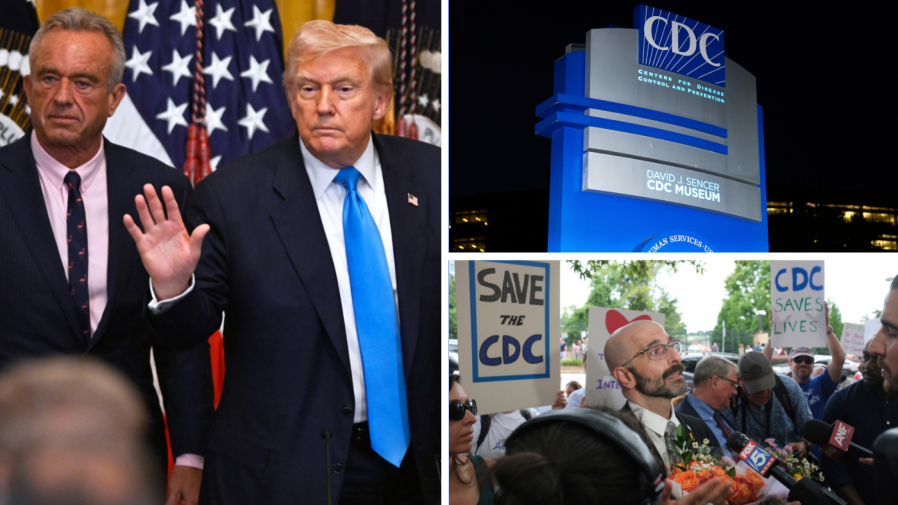
President Trump’s administration is facing fallout from this week’s leadership shakeup at the Centers for Disease Control and Prevention (CDC), where the agency’s director was terminated and other top officials resigned. The president fired Susan Monarez on Wednesday after she clashed with Health and Human Services (HHS) Secretary Robert F…
Read More
Politics
Chicago mayor vows to fight Trump intervention, signs protective order
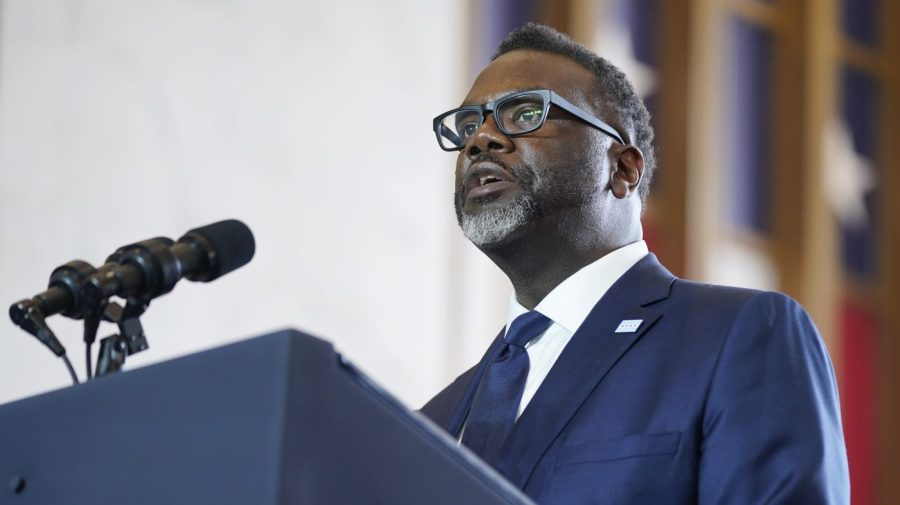
Chicago Mayor Brandon Johnson (D) signed an executive order detailing how the Windy City will attempt to respond to President Trump’s potential deployment of the National Guard. Johnson’s executive order, which he signed on Saturday, established the “Protecting Chicago Initiative” to protect the constitutional rights of Chicago residents amid the “possibility of imminent militarized immigration…
Read More
-
Uncategorized10 months ago
Bob Good to step down as Freedom Caucus chair this week
-

 The Josh Fourrier Show10 months ago
The Josh Fourrier Show10 months agoDOOMSDAY: Trump won, now what?
-

 Politics10 months ago
Politics10 months agoWhat 7 political experts will be watching at Tuesday’s debate
-

 Politics6 months ago
Politics6 months agoFormer ‘Squad’ members launching ‘Bowman and Bush’ YouTube show
-

 Politics10 months ago
Politics10 months agoHow Republicans could foil Harris’ Supreme Court plans if she’s elected
-

 The Dictatorship6 months ago
The Dictatorship6 months agoPete Hegseth’s tenure at the Pentagon goes from bad to worse
-
Economy10 months ago
Fed moves to protect weakening job market with bold rate cut
-

 Politics10 months ago
Politics10 months agoRFK Jr.’s bid to take himself off swing state ballots may scramble mail-in voting


